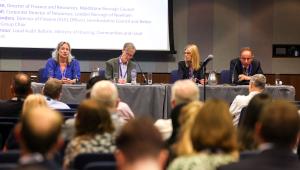The Smarter government document is a mixture of good ideas, bad ideas and electioneering.
It is good that ministers are focused on the opportunity to pursue some radical changes in how government is organised. If anything, we should be seeing more of this – the digital age, for instance, should introduce massive changes to how the public sector does its business and how citizens respond. This feels like a once-in-a-generation opportunity to push the boundaries of what is possible.
One of the bad ideas relates to consultancy, with the announcement that Whitehall spending will be cut in half. I say this, not because the Management Consultancies Association wants to or will defend every penny of spending on management consultancy. In any case, the word covers a lot of central government activity, much of it not management consultancy at all, but communications, legal, financial and other work. And we understand that consultancy isn’t immune from the downturn.
No, I’m worried because a wiser government would see that consultancy is going to be crucial over the next few years in helping it to achieve all the spending and organisational objectives that are set out in the rest of this plan. Private sector leaders understand this point very well. And they would be explaining how they intend to work with the industry to achieve their objectives.
Consultants should be used by the government where there is a clear business case and value is delivered for the taxpayers. The public sector can certainly improve how it uses consultancy. We are pressing for a greater focus on the outcomes of consulting projects and more sharing of risks and rewards with consultancies, which we are already seeing much more of in the private sector. This is a much better way to ensure that the taxpayer gets full value for money.
So is this part of the electioneering now under way?
This 50% cut has all the hallmarks of an arbitrary and ‘make-up-the-numbers’ approach to policy-making. If it wasn’t, there would surely be more analysis and explanation – starting with an open assessment of the money involved and the likely impact on public services. Ministers would start with a value for money examination of how central government uses consultancy and, then, compare that with the needs they think there will be in the future.
Reducing the public sector deficit will require the government to make use of all the expertise it can; making cuts in the use of consultants could easily leave the government unable to rebalance the books.
Alan Leaman is chief executive of the Management Consultancies Association










